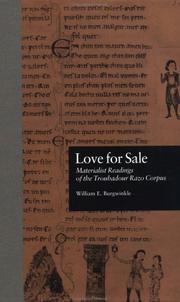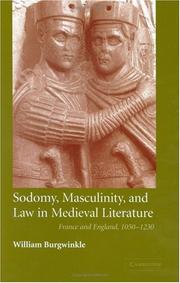| Listing 1 - 6 of 6 |
Sort by
|

ISBN: 0815328427 Year: 1997 Publisher: New York Garland
Abstract | Keywords | Export | Availability | Bookmark
 Loading...
Loading...Choose an application
- Reference Manager
- EndNote
- RefWorks (Direct export to RefWorks)
Poetry --- Provençal, Occitan literature --- anno 500-1499 --- Literature and society --- Love poetry, Provençal --- Troubadours. --- History and criticism.

ISBN: 9780521839686 0521839688 9780511484735 9780521118583 0511211430 9780511211430 0511216807 9780511216800 0511213204 9780511213205 0511215010 9780511215018 0511484739 1107151139 9781107151130 1280540915 9781280540912 0511315503 9780511315503 0521118581 9786610540914 6610540918 Year: 2004 Publisher: Cambridge, U.K. New York Cambridge University Press
Abstract | Keywords | Export | Availability | Bookmark
 Loading...
Loading...Choose an application
- Reference Manager
- EndNote
- RefWorks (Direct export to RefWorks)
William Burgwinkle surveys poetry and letters, histories and literary fiction - including Grail romances - to offer a historical survey of attitudes towards same-sex love during the centuries that gave us the Plantagenet court of Henry II and Eleanor of Aquitaine, courtly love, and Arthurian lore. Burgwinkle illustrates how 'sodomy' becomes a problematic feature of narratives of romance and knighthood. Most texts of the period denounce sodomy and use accusations of sodomitical practice as a way of maintaining a sacrificial climate in which masculine identity is set in opposition to the stigmatised other, for example the foreign, the feminine, and the heretical. What emerges from these readings, however, is that even the most homophobic, masculinist and normative texts of the period demonstrate an inability or unwillingness to separate the sodomitical from the orthodox. These blurred boundaries allow readers to glimpse alternative, even homoerotic, readings.
Homosexuality in literature. --- Sodomy in literature. --- Masculinity in literature. --- Literature, Medieval --- Homosexuality --- Sodomy --- Homosexualité dans la littérature --- Sodomie dans la littérature --- Masculinité dans la littérature --- Littérature médiévale --- Homosexualité --- Sodomie --- History and criticism. --- History. --- Histoire et critique --- Histoire --- Buggery --- Pederasty --- Sex crimes --- Same-sex attraction --- Sexual orientation --- Bisexuality --- Masculinity (Psychology) in literature --- Arts and Humanities --- Literature --- History
Book
ISBN: 082405346X Year: 1990 Publisher: New York Garland
Abstract | Keywords | Export | Availability | Bookmark
 Loading...
Loading...Choose an application
- Reference Manager
- EndNote
- RefWorks (Direct export to RefWorks)
Book
ISBN: 9780521897860 0521897866 9780511976322 Year: 2011 Publisher: Cambridge Cambridge University Press
Abstract | Keywords | Export | Availability | Bookmark
 Loading...
Loading...Choose an application
- Reference Manager
- EndNote
- RefWorks (Direct export to RefWorks)
"From Occitan poetry to Francophone writing produced in the Caribbean and North Africa, from intellectual history to current films, and from medieval manuscripts to bandes dessine;es, this History covers French literature from its beginnings to the present day. With equal attention to all genres, historical periods and registers, this is the most comprehensive guide to literature written in French ever produced in English, and the first in decades to offer such an array of topics and perspectives. Contributors attend to issues of orality, history, peripheries, visual culture, alterity, sexuality, religion, politics, autobiography and testimony. The result is a collection that, despite the wide variety of topics and perspectives, presents a unified view of the richness of French-speaking cultures. This History gives support to the idea that French writing will continue to prosper in the twenty-first century as it adapts, adds to, and refocuses the rich legacy of its past"--
Book
ISBN: 0192568590 9780192568595 9780198832454 0198832451 0191888826 Year: 2020 Publisher: Oxford : Oxford University Press,
Abstract | Keywords | Export | Availability | Bookmark
 Loading...
Loading...Choose an application
- Reference Manager
- EndNote
- RefWorks (Direct export to RefWorks)
Oxford Studies in Medieval Literature and Culture showcases the plurilingual and multicultural quality of medieval literature and promotes work that not only focuses on the whole array of subjects medievalists now pursue-in literature, theology, philosophy, social, political, jurisprudential, and intellectual history, the history of art, and the history of science-but also work that combines these subjects productively. It offers innovative and interdisciplinary studies of every kind, including but not limited to manuscript and book history, linguistics and literature, post-colonial and global studies, the digital humanities and media studies, performance studies, the history of affect and the emotion, the theory and history of sexuality, ecocriticism and environmental studies, theories of the lyric, of aesthetics, of the practices of devotion, and ideas of medievalism.The field of medieval francophone literary culture outside France was for many years a minor and peripheral sub-field of medieval French literary studies (or, in the case of Anglo-Norman, of English studies). The past two decades, however, have seen a major reassessment of the use of French in England, in the Low Countries, in Italy, and in the eastern Mediterranean, and this impacts significantly upon the history of literature in French more generally. This book is the first to look at the question overall, rather than just at one region. It also takes a more sustained theorised approach than other studies, drawing particularly on Derrida and on Actor-Network Theory. It discusses a wide range of texts, some of which have hitherto been regarded as marginal to French literary history, and makes the case for this material being more central to the literary history of French than was allowed in more traditional approaches focused narrowly on 'France'. Many of the arguments in Medieval French Literary Culture Abroad are grounded in readings of texts in manuscript (rather than in modern critical editions), and sustained attention is paid throughout to manuscripts that were produced or travelled outside the kingdom of France.
French literature --- Appreciation --- History and criticism --- E-books --- 091 =40 --- 091 "1250/14" --- 091 "1250/14" Handschriftenkunde. Handschriftencatalogi--13e-15e eeuw. Periode 1250-1499 ('late middeleeuwen') --- Handschriftenkunde. Handschriftencatalogi--13e-15e eeuw. Periode 1250-1499 ('late middeleeuwen') --- 091 =40 Handschriftenkunde. Handschriftencatalogi--Frans --- Handschriftenkunde. Handschriftencatalogi--Frans --- History and criticism. --- Old French literature --- History of civilization
Book
ISBN: 1316169340 1316172325 0511976321 Year: 2011 Publisher: Cambridge : Cambridge University Press,
Abstract | Keywords | Export | Availability | Bookmark
 Loading...
Loading...Choose an application
- Reference Manager
- EndNote
- RefWorks (Direct export to RefWorks)
From Occitan poetry to Francophone writing produced in the Caribbean and North Africa, from intellectual history to current films, and from medieval manuscripts to bandes dessinées, this History covers French literature from its beginnings to the present day. With equal attention to all genres, historical periods and registers, this is the most comprehensive guide to literature written in French ever produced in English, and the first in decades to offer such an array of topics and perspectives. Contributors attend to issues of orality, history, peripheries, visual culture, alterity, sexuality, religion, politics, autobiography and testimony. The result is a collection that, despite the wide variety of topics and perspectives, presents a unified view of the richness of French-speaking cultures. This History gives support to the idea that French writing will continue to prosper in the twenty-first century as it adapts, adds to, and refocuses the rich legacy of its past.
| Listing 1 - 6 of 6 |
Sort by
|

 Search
Search Feedback
Feedback About UniCat
About UniCat  Help
Help News
News